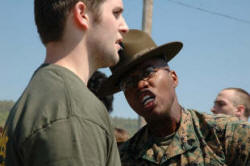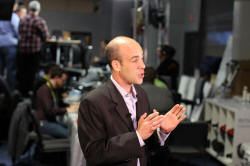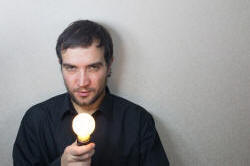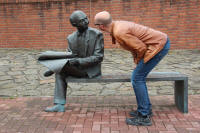Reported or indirect speech

This first section mostly reiterates material in the initial training
section and is here as a reminder of the basics. You can skip this
if you are already aware of the basic issues or have recently worked
through the initial training section for this area.
If that is the case, skim through what follows, and/or do
the mini-test and
then move on. It's up to you.
 |
Consider these pairs |
| I was in London | He said he had been in London |
| I can help | She said she could help |
On the left we have the direct speech – the words uttered.
On the right we have reported or indirect speech – how the message
is passed on.
On the face of it, there's nothing terribly difficult about this
idea. The tense shifts back one (from, e.g., was to
had been, from can to could). At the same
time, I changes to he, we changes to they
and so on.
Here's a list of
the changes in English.
| Language item | Change |
| Present simple changes to past simple | I am in London He said he was in London |
| Past simple, present perfect and past perfect all come out as past perfect | I was in France She said she had been in France I have been to France She said she had been to France I had been to France She said she had been to France |
| Present progressive changes to past progressive | I am writing to
him He said he was writing to them. |
| Future 'will' changes to 'would' | I'll go later He said he'd go later |
| Future 'will be'+ ing changes to 'would be' + -ing | I'll be seeing
him tomorrow She said she'd be seeing him tomorrow |
| Future 'will have' + past participle changes to 'would have' + past participle | I'll have done
it He said he would have done it |
| Other changes | |
| Pronouns change as appropriate | I / We / want to be there I / He / She / We / They said I / she / he / we / they wanted to be there |
| Time and place expressions change as appropriate | I like it here She said she liked it there I am going tomorrow He said he was going the next day |
| Modal auxiliary verbs change to their 'past' equivalents if there is one | I may see him He said he might see him I must go now He said he had to go then |
 |
Using common sense |
Of course, not all changes are always appropriate (but using the
changes will usually be correct).
If we are reporting something virtually simultaneously, then we often
don't change the tense or time expressions. If we are reporting
something in the same place, then we don't change the place expressions.
So we might get:
A: I'm going there now.
B: What did he say?
C: He said he's going there now.
If an utterance remains true, we often don't change the tense so we
get, e.g.,
I'm from South Africa = He said he's from
South Africa
I love the countryside = She said she loves
the countryside
Try this matching exercise to make sure you have understood so far.
Did you notice the changes, particularly with time and place expressions but also with the verb come (which changed to go)?
If you have followed so far, this will be familiar:
| 1 | "I was in London," he said | 4 | He said he had been in London |
| 2 | "I can help," she said | 5 | She said she could help |
| 3 | "You are welcome to come. Would you like to bring Mary?" he said | 6 | He said I was welcome to come and would I like to bring Mary |
It's clear that we have examples of direct speech and indirect speech
here in sentences 1, 4, 2 and 5 but Sentence 6 is what is called a hybrid form because the first part follows the
'rules' but the second part actually changes only the pronoun, from
you to I.
If the sentence followed the reported speech 'rules', it should be
He said I was welcome to come and asked
if I would like to bring Mary
which is another possibility, of course, but sounds quite formal.
 |
Reporting closed questions with if and whether |
| "Were you there on the night?" | They asked whether I was / had been there on the night |
Closed questions are those which require a Yes or No response and
they are usually reported with if or whether. We
get, therefore, for example:
Are you going to the cinema?
reported as
He asked her if she was going to the cinema
There is a bit more to it, however.
Consider what direct speech is being reported in the following.
- I asked whether there were any good recipes in it.
- I asked if there were any good recipes in it.
- She wondered whether to go.
- He asked whether or not they could come.
When you have done that, try reporting these sentences (from the
point of view of later and
elsewhere).
Then click to
reveal the comment.
- “Are they English?”
- “I wonder if they are English.”
- “I’m wondering whether to join you.”
- "Can I talk to you?"
You should have something like:
- "Are there any good recipes in it?"
- "Are there any good recipes in it?" I asked
- "Shall I go?" she wondered / asked herself
- "Can they come?" he enquired
- She asked whether / if they were English
- He wondered whether they were English
- She was wondering whether to join us
- She asked whether / if she could speak to me
In reporting a direct question, you can use if or whether interchangeably but if you are reporting someone's thoughts and doubts, only whether is possible.
 |
Reporting open wh-questions |
| Who are you looking at? | It asked me who I was looking at |
Open questions are usually phrased using wh-words: who,
what, why, where, how. They cannot be predicted to have a
Yes-No-Maybe answer.
Questions formed in this way cannot be reported with if or
whether. The reporting is done by embedding the questions.
Embedding is often associated with polite questioning so, instead of
the direct:
Where is the station?
we form polite embedded questions such as
Can you tell me where the station is?
So it is with reported questions. Thus:
| Where is the station? | → | He asked me where the station is / was |
| What is the time? | → | She asked me what the time was / is |
| When are you arriving? | → | He asked me when I was / am arriving |
| Who is coming with you? | → | She asked them who was / is coming with them |
| Why are they late? | → | She asked why they were / are late |
The tense chosen will often conform to the time and place of the reporting using the common-sense rules discussed above although back-shifting tenses where possible is common even when the reporting is virtually simultaneous.
The big issue for learners with this kind of reporting is the
ordering of the subject and verb. Most language will lead learners
to produce errors such as:
*Can you tell me when is the film beginning?
*Do you know who is the lady there?
etc.
And this will also carry over to reported questions so we get:
*She asked me where is the zoo
*They enquired what time did the train leave
and so on.
Other reporting verbs such as explain, clarify, complain,
mention, remember and state will produce similar errors
because the structures are parallel to reported questions in English but
not paralleled in many other languages. We may encounter,
therefore:
*She explained how did the machine work
*They clarified what did they need
*I remembered where was I going
See below for more on reporting verbs.
 |
that and what |
What are the rules for using that and what in reported speech? Report the following using that or what if possible and then reveal the commentary.
- "I am coming now."
- "I don't know her name."
- "What's your name?"
- "My name is Mary."
- "I will not go if it rains"
Rule 1: you can't use that in reporting questions or
if-clauses.
So we can have:
He said (that) he was coming then / is coming now
She said (that) she didn't / doesn't know her name
She said (that) her name is / was Mary
but not:
*He asked that is her name
*She said (that) she would not go that if it
rained
Rule 2: Conditional sentences may be back-shifted but that may not be
used in them.
At all other times, that can be dropped with no loss of sense, but some
loss of formality.
Rule 3: to report open questions,
we have choices. We can't use that
but we can, with a change to an embedded question, use what:
He asked her her name /
He asked her what her name was
but not, usually:
?He asked her what was her name
 |
Tense shifting |
As we saw in part 1 of this guide, tense shifting is common in English and it is rarely wrong to do it. However:
- If the reporting verb is in the present, we don't shift
tenses. So we get
She often says, "I don't know what to do"
changing to
She often says she doesn't know what to do
"There was a nasty accident here last night," John informs me
changing to
John tells me there was a nasty accident here / there last night.
(Note that last night does not change because the reporting is of a recent utterance.) - If the validity of what was said still holds. For
example:
Darwin wrote, "There is grandeur in this view of life."
changes to
Darwin wrote that there is grandeur in this view of life.
not to
Darwin wrote that there was grandeur in this view of life - Although back-shifting could be used in all the above
examples, there are rare times when it actually produces
nonsense. Try reporting
"I chose to study French because it was a beautiful language."
Will you accept
He said he had chosen to study French because it had been a beautiful language?
 |
Reporting commands and exclamations |
We saw above that question forms are reported differently from statements. How would you report these? Click here to reveal some comments.
- "What awful weather!" she exclaimed.
- "Stop fidgeting!" she said to John.
- "Stop fidgeting," she growled.
Sentence 19 could be rendered as
She
exclaimed / said / remarked loudly what awful weather it was.
It can't be reported without a change of grammar.
Sentence 20 can be reported as
She told John to
stop fidgeting but ...
Sentence 21 can't be reported this way. It
has to be something like
She growled at John to stop fidgeting
Note that we have to insert the object here.
 |
Deixis |
Here's a definition:
The name given to those aspects of language whose interpretation
is relative to the occasion of utterance
Fillmore (1966) in Harman (1989)
It's an important phenomenon in this area because the use of
deixis neatly explains a lot of the so-called anomalies of indirect
speech. Because meaning is dependent on the point of view,
time, location and place of the speaker / writer we are
obliged (or not) to change, e.g., bring to come, come
to go (and go to come), this
to that, here to there, yesterday to the
previous day, now to then, bring to take and
so on.
In this regard, the following changes now make more sense:
| "I want you to come to me now." | He said he wanted me to go to him then |
| "I'll go next year," she said | She said she would go the following / next year |
| "I want to bring this food with me," he said | He said he wanted to take that food with him |
Once again, we find that context makes meaning. The common-sense rule (see above) is now explained.
For more, there is a guide to deixis on this site, linked below, which includes a larger image of the wheel above and explains what it all means.
 |
Reporting verbs |
Essentially, there are three types. Can you categorise this list into three groups? Click to reveal, as usual.
| say | cry | ask |
| tell | order | offer |
| invite | shout | explain |
| Simple reporting verbs | Verbs which show how something was said | Verbs which show the intentions of the speaker |
| say | cry | invite |
| ask | sneer | offer |
| tell | shout | order |
The simple reporting verbs in the left-hand column often require only the deixis, pronoun and tense shifts covered in this guide. So we can have, e.g.:
| "I'm off tomorrow," she said | → | She said she was / is off the next day / tomorrow |
| "I'm studying Chemistry," he told me | → | He told me he is / was studying Chemistry |
Sometimes, however, in order to retain the sense, we need to make more fundamental changes to the syntax, such as:
| "Go away," she said | → | She told / ordered me to go away |
| "Read a book," he sneered | → | He told him sneeringly to read a book |
| "I'm sorry," he said | → | He apologised |
| "I guess around £200," he said | → | He estimated it at around £200 |
| "But that's not true," he interrupted | → | He interrupted to say that it wasn't / isn't true |
| "Please help," she pleaded | → | She pleaded for help |
| "Are there any questions?", he said | → | He invited questions from the audience |
Purely for information, there's a PDF of a list of reporting verbs in English list. Click to download a list of reporting verbs. Don't try to teach them all at once!
There is also a guide to the kinds of reporting verbs used in academic writing, linked below, which contains a list of over 150 verbs such as state, aver, suggest, discount, dismiss, investigate etc.
|
|
Modal auxiliary verbs |
To sum up:
- If a modal has a past equivalent, it may backshift to that so we
get may (for permission) / might and can / could, have to / had
to. Thus:
You may go → She said we might go (then) or She said we may go (now) I can play the piano → She said she could play the piano (then) or She said she can play the piano (timeless enduring ability) I have to see the doctor → She said she had to see the doctor (then) or She said she has to see the doctor (now / future)
- Those without past equivalents (could, might, ought to, used
to, should)
remain unchanged. Thus:
I could help → He said he could help (then or now) That might help → He said that might help (then or now) I ought to see the doctor → He said he ought to see the doctor (then or now) I used to take my holidays there → He said he used to take his holidays there (a discontinued past habit) You should work harder → He said I should work harder (current mild obligation)
- The modal may / might is slightly confusing because it
is used for both permission (when may is often back-shifted to
might) and for possibility when no change is apparent.
Thus
You may go → She said we might go (permission given in the past) I may talk to her → She said she may talk to her (concerning a current future possibility) or She said she might talk to her (concerning a possibility in the past) I might go for a walk → She said she might go for a walk (concerning a slightly less likely possibility then or now)
 |
Teaching issues |
There is nothing very difficult about the form of reported speech changes (providing a learner is already familiar with the tense forms of English). However:
- Because of the 'common sense' issues touched on above, you need to make sure that the language is very clearly set in a time-and-place context.
- It is almost impossible to practise the form changes in class by getting students to report each other's utterances because time and place remain static. You need to spread the practice over time and place to be authentic.
- You need to make sure that learners are aware of the common-sense issues and don't slavishly transform every utterance.
- Languages deal with the issues differently. Some, for example, reserve a subjunctive tense for reported speech and some hardly make any changes at all.
 |
Teaching ideas |
Teaching the mechanics of indirect speech is not too challenging
providing the learners have a grasp of the tense forms and pronoun
systems but one does need to address different forms separately or it all
becomes a mass of data that bewilders learners.
A sensible approach is to apply the analysis as above, focusing on
reporting declarative statements, yes-no questions, open, wh-questions,
exclamations, orders and so on separately before making any attempt
to combine ideas.
Here's an idea for teaching indirect speech and still applying the common-sense rules.
Step 1:
Use a little task sheet like this:| Write three things which are true about you now: | Your name: ________________ | ||
| Always true | Example: I like reading | Your sentence: | ____________________________________ |
| The past | Example: I studied Italian at school | Your sentence: | ____________________________________ |
| Tomorrow | Example: I am having lunch at home tomorrow | Your sentence: | ____________________________________ |
Step 2:
Distribute the papers randomly but making sure the learners don't get their own.
Now we come to the crux:
Statements like
I enjoy classical music
can be reported in two ways (both correct):
Sheena wrote that she enjoyed classical music
Sheena wrote that she enjoys classical music
Other statements will need to be amended according to the rules of deixis in English so we might get:
Raoul wrote that he was going to the cinema the next day
Michel wrote that he had eaten macaroni for lunch that day
etc.
Obviously, this is contrived and artificial to some extent but it is personalised and situates the language temporally and spatially. It is certainly better than meaningless sentence-transformation exercises.
 |
The word-order issue: what was the question? |
Because the word order when reporting questions and using a number of the reporting verbs is a common source of error, it is worth practising separately. Fortunately, the use of back-shifting, even for virtually simultaneous reporting, is also common so there is less need to set up delayed reporting.
Step 1:
Focus on an area in which it will be natural to ask lots of questions.
Focusing on the teacher's life experiences is a good way to begin so
that might evince questions like
Where did you go to school
Why did you decide to be a teacher?
Where have you taught?
Do you enjoy teaching?
etc.
Depending on the level of the learners a list of 20 or so things they
want to know about the teacher is not too ambitious.
Step 2:
Once the learners, in pairs or individually, have their lists of things
they want to know and have properly formed questions they can ask them
in open class. Unfortunately, at this point, the teacher becomes
somewhat deaf and is forced to ask another student what the question was
so we get, for example:
Petra: Where did you train to be a teacher?
Teacher: I didn't get that. What was the question,
Maria?
Maria: She asked you where you trained.
and so on.
Step 3:
Now, in groups of three, the learners play the same game, deciding on
what things they want to know about the others in their group and having
one questioner, one slightly deaf responder and one reporter in each
trio. They all get a turn at playing each role.
Note that:
- You have to teach the forms before you can launch into this kind of practice and
- The questions may well be mixes of wh-questions and
closed questions so the reporting will include formulations such as
He asked you why you became a teacher
and
She asked you if / whether you enjoy teaching
You can set up the task to exclude one or other type of question, of course, but that's a lot less natural.
| Related guides | |
| nominalised clauses | for an alterative way to look at reported or embedded questions inter alia |
| a list of reporting verbs | for a list of the commonest possibilities |
| reporting verbs in academic writing | for a guide to reporting what people said or wrote in EAP contexts |
| modality | for the index to guides to this area |
| deixis | for more on a key area |
Click here for the test.
References:
Chalker, S, 1987, Current English Grammar, London:
Macmillan
Harman, I P, 1989, Teaching indirect speech: deixis points the
way, English Language Teaching Journal, Volume 44, No 3,
pp230-238, Oxford: Oxford University Press
